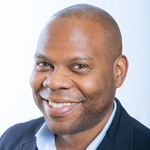I remember the day I was compared to a runaway slave. It was early last year and I was a member of a judging panel for a well-known tech startup competition. Unlike me, the other judges were mostly white men. And even though I’m now pretty comfortable in settings like these, I always have a gnawing feeling that, as a black man, I don’t fully belong and that people might view me as an outsider. So I find various ways to try and fit in. In this case, it meant asking the other judges what they’d thought of the startups. But in response to what I believed was a sincere attempt on my part at creating a connection, one of the gentlemen paid me what I can only describe as the most backhanded compliment I’ve ever received.
“You were like Gary Unchained,” he told me, with a whimsical smile on his face. He was trying to compliment me for what he described as my ability to ask tough, to-the-point questions. The reference was to the Quentin Tarantino movie Django Unchained, in which a liberated slave becomes an apprentice to a white doctor and violently kills scores of white southerners before freeing his wife from the clutches of a charming but brutal slave master, played by Leonardo DiCaprio.
“Um, thanks,” I laughed nervously, not sure how else to respond and worried that someone else might have heard. Now I’ve been called lots of things – and it’s not always been positive – but I don’t think anyone’s ever called me a slave. At least not to my face, anyway. And that might be the point: even if nobody ever says it directly, part of me always wonders what people are really thinking about me. This is perhaps why it’s been hard for me to ever feel that I fully belong in elite and often non-diverse environments.
If we’re all brutally honest, we know that I don’t match the image of what a typical entrepreneur or executive looks like and a lot of people are surprised when I turn out to be the person they’re supposed to meet. I know that my existence might cause some cognitive dissonance. I’m not just a former professor or Yale-trained lawyer or entrepreneur: I’m a black man too. Through encounters like these and countless conversations about diversity, it’s become clear that discrimination isn’t a historical problem. And those of us who point this out shouldn’t be accused of being stuck in the past.
It bewilders me that the same species that figured out how to fly, cheat death and stream movies on mobile phones can’t figure out how to uproot and end discrimination. Women, racial minorities, immigrants, LGBT people and members of lower socioeconomic classes are still underrepresented in positions of power, including in tech and in business. The real question is what we’re going to do about it. And this is part of what spurred Wayra on to try and address diversity within the tech community.
As a start, we launched a startup DNA digest of the UK tech community’s demographic makeup. This confirmed that the ecosystem is mostly male, upper-class and white. But while it was great that the study got a lot of coverage, we knew we had to go a step further by reaching out to members of underrepresented groups who are entrepreneurs, investors, speakers or mentors and ask them to work with us.
And when we realised that this still wasn’t disruptive enough, we embarked on a mission to democratise entrepreneurship by setting up satellite spaces outside of London. This meant opening up in places like Oldham and Tottenham to remind people of the opportunities they have. As Beyonce sang in Formation: “You might just be a black Bill Gates in the making; I might just be a black Bill Gates in the making”.
I look forward to the day a black person is more likely to be associated with Bill Gates than Django. ![]()
Share via:


















































